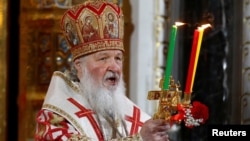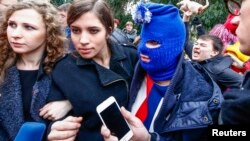The head of the Russian Orthodox Church, Patriarch Kirill, recently said that the Soviet Union preserved Russia’s Christian morality – a claim that raised more than a few eyebrows. Omitting any mention of the Soviet government’s mass persecution of religious institutions, Kirill’s words appeared to some as an attempt to reconcile Russia’s conservative Orthodox traditions with its Soviet past.
One of Russia’s most outspoken critics of the Church, however, isn’t convinced.
Alexander Nevzorov, a former member of the Russian parliament, journalist, author and filmmaker, is one of the few public figures who has actively criticized what he and others have called the “clericalization” of Russia. That term refers to the growing involvement of the Russian Orthodox Church in state affairs, despite Article 14 of Russia’s constitution, which explicitly declares the country “a secular state.”
“Everything we see the Russian authorities doing is only the continuation of standard, primitive, imperial policies which definitely include an Orthodox component,” Nevzorov said.
Still, Nevzorov said he doubted that Kirill’s recent statement was an attempt to reconcile Christian faith with the Soviet past.
“I can’t take his [Kirill’s] statements seriously,” he said. “I don’t see any content in them besides clowning, affectation, and pretentiousness.”
'Miracle of God'
Patriarch Kirill, whose secular name is Vladimir Gundyayev, was installed as patriarch after the death of his predecessor, Alexei II. Since Vladimir Putin returned to the Kremlin for a third presidential term in 2012, the patriarch, who has called the Russian president’s rule a “miracle of God,” has been seen as a close ally of the Russian president, as Putin himself has increasingly used the Orthodox Church to try to legitimize his actions.
In a speech on the annexation of Crimea in 2014, Putin characterized the peninsula as sacred land to Russians, referring to the baptism of Vladimir the Great in Kherson [part of present-day Ukraine] in 988. "His spiritual feat of adopting Orthodoxy," Putin said of Vladimir, "predetermined the overall basis of the culture, civilization and human values that unite the peoples of Russia, Ukraine and Belarus."
Kirill has in turn blessed Putin’s foreign policy, such as in 2015 when a spokesman for the patriarch called Putin’s military campaign in Syria a “holy battle.”
In between such grandiose statements, Kirill has often come under criticism for his interference in domestic politics as well as for his allegedly extravagant lifestyle.
Case of Pussy Riot
Both criticisms overlapped in 2012, during the case of Pussy Riot, a feminist punk band that staged an anti-Putin demonstration in Moscow’s Cathedral of Christ the Savior. While many believers urged mercy and forgiveness for the three women on trial, Kirill publicly condemned such sentiments and declared that the women had been doing the work of the devil.
Around this time, observant critics noted that the patriarch had been seen on several occasions wearing a Swiss Breguet watch valued at more than $30,000. Kirill denied the claims and, in a now-infamous photo, the watch was airbrushed off his wrist. Whoever doctored the photo neglected to remove the watch’s reflection in the table where Kirill was sitting.
For the three members of Pussy Riot, however, there was little cause for amusement. Two of the band’s members were sentenced to two years in a penal colony, only to be released in December 2013 as part of an amnesty ahead of the Winter Olympics held in Sochi the following year.
In June 2013, Russia’s lower house of parliament, the State Duma, overwhelmingly passed legislation that criminalized acts committed “with the purpose of offending the feelings of religious believers.” Potential sentences for those convicted include steep fines and a prison sentence of up to two years.
Supporter of controversial bills
The Russian Orthodox Church also supported other controversial bills, such as the ban on adoption of Russian children by American citizens and the so-called “gay propaganda law,” which bans the “promotion” of “non-traditional relationships” to minors.
The new laws were believed to be an attempt to bolster Putin’s image of Russia as a bastion of “traditional values” and Christianity.
As for critics who express concern for human rights in Russia, Patriarch Kirill has a rebuttal. Speaking after a service in March of this year, the patriarch called belief in human rights that contradict the Bible a “global heresy.”
“Many Christians have accepted these views and gave more priority to human rights than the word of God,” he said. “We must protect Orthodoxy from the heresy of our times."
(Jim Kovpak is an American writer in Moscow who runs the Russia Without BS blog https://nobsrussia.com/.)






